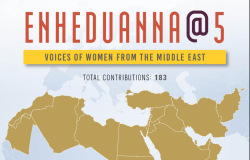
A blog of the Middle East Women's Initiative
The Impact of the Russian-Ukrainian War on Yemen

anasalhajj / shutterstock.com
The repercussions of the Ukrainian crisis have further exacerbated food insecurity crisis in Yemen, as Yemen imports 40 percent of its wheat from Ukraine and Russia.
Yemen is enduring a humanitarian catastrophe due to the repercussions of the war that has been going on since 2015. The war has led to the deterioration of living and economic conditions and the disruption of public services. And, deepened the suffering of Yemeni families, especially displaced people who have been forced to live in poorly serviced and spontaneous camps or in unsanitary and insufficient housing within the cities of the different governorates of Yemen. The cities already suffered from poor basic services and a lack of decent livelihood opportunities prior to the war.
The concept of the humanitarian situation is based on several criteria: food security, personal security, health security, community security, economic security, and political security. Unfortunately, these standards are almost non-existent in Yemen. However, the most significant challenge facing Yemen is food insecurity, which may intensify and reach catastrophic levels in light of the rising prices for basic foodstuffs because of the repercussions of the Russian-Ukrainian war on food supply to Yemen, a country highly dependent on food imports from abroad.
Women and children in particular bear the impact of the complex crisis in Yemen, as they make up more than two-thirds of the displaced in Yemen (more than 4.3 million people). It is expected that the number of people suffering from food insecurity will increase to 19 million by the end of 2022, according to the statements of United Nations bodies.
Unfortunately, the repercussions of the Ukrainian crisis have further exacerbated food insecurity crisis in Yemen, as Yemen imports 40 percent of its wheat from Ukraine and Russia. The recent war on Ukraine has imposed significant restrictions on grain supply, on which the majority of the Yemeni population depend for their sustenance. This has resulted in a dramatic increase in food prices. Wheat prices soared by 35 percent compared to their prices at the beginning of the war; the price of 50 kg of wheat rose from 29,000 Yemeni riyals ($22) before the Ukrainian-Russian war to 41,000 Yemeni riyals ($31) after its outbreak. The Russian-Ukrainian War has also led to the disappearance of the wheat supply in the Yemeni markets, which resulted in the inability of families - and the displaced in particular - to purchase their needs of wheat and grain. It has also resulted in fuel supply crisis, adding an additional burden and making the situation much worse and even more difficult due to the high transportation costs.
At the same time, concerns are also growing about humanitarian aid, especially since Yemen is already suffering from fragile conditions. Millions of Yemenis depend on food aid to survive. The war, which has killed almost 380,000 people, directly or indirectly, entered its eighth year, according to the UN. The increasing number of the displaced, who are dependent on humanitarian relief assistance, raises some concerns about the possibility of stopping basic humanitarian assistance, which would be like cutting the lifeline for millions of people dependent on it. Furthermore, the failure to address the food, economic, and security conditions may herald an increase in tension in Yemen and the outbreak of massive popular protests for what is known as “Revolution of the Hungry”.
About the Author

Middle East Program
The Wilson Center’s Middle East Program serves as a crucial resource for the policymaking community and beyond, providing analyses and research that helps inform US foreign policymaking, stimulates public debate, and expands knowledge about issues in the wider Middle East and North Africa (MENA) region. Read more

Middle East Women's Initiative
The Middle East Women's Initiative (MEWI) promotes the empowerment of women in the region through an open and inclusive dialogue with women leaders from the Middle East and continuous research. Read more










